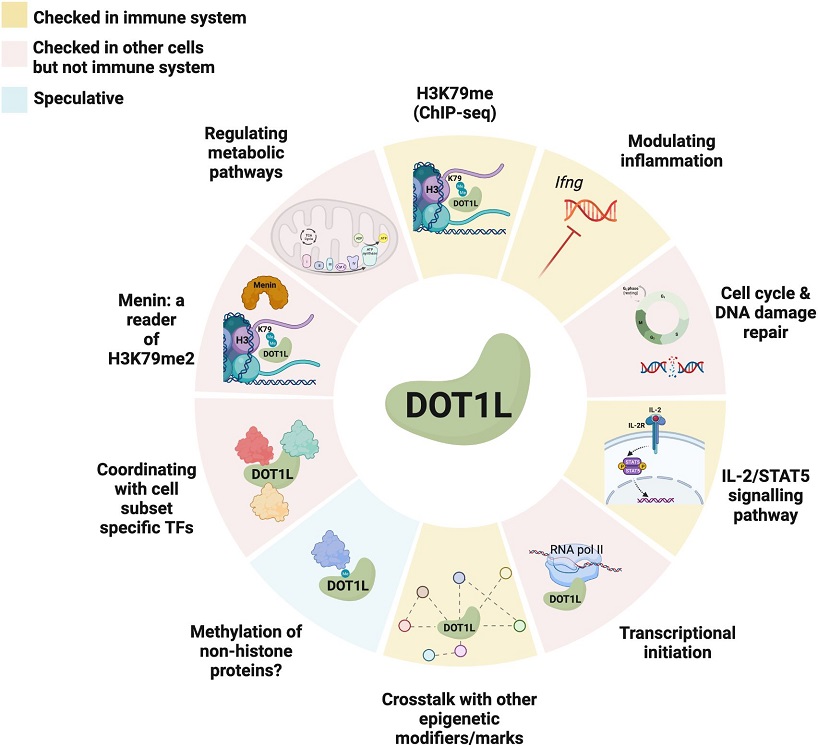Immunology updates: Newly discovered role of DOT1L in shaping the defense system
Nikhil Prasad Fact checked by:Thailand Medical News Team Jun 20, 2024 1 year, 7 months, 3 weeks, 4 days, 23 hours, 58 minutes ago
Immunology updates: In the complex world of our immune system, a molecule called DOT1L is emerging as a crucial player. DOT1L stands for "Disruptor of Telomeric Silencing 1-like." Initially discovered in yeast, this molecule has gained significant attention for its role in regulating immune cells in humans. This
Immunology Updates new report is based on a study review by researchers from Monash University-Australia and the Luxembourg Institute of Health.
 Immunology updates: Newly discovered role of DOT1L in shaping the defense system
Known and potential mechanisms of action of DOT1L in immune and non-immune cells. Different tile colours represent studies that were performed in either the immune system (yellow), other cells (red), or are speculative (blue).
What is DOT1L?
Immunology updates: Newly discovered role of DOT1L in shaping the defense system
Known and potential mechanisms of action of DOT1L in immune and non-immune cells. Different tile colours represent studies that were performed in either the immune system (yellow), other cells (red), or are speculative (blue).
What is DOT1L?
DOT1L is a type of enzyme known as a methyltransferase. It works by adding methyl groups to a specific spot on a histone protein called H3K79. Histones are proteins that help package our DNA into a compact, organized structure. By modifying histones, DOT1L can control which genes are turned on or off, thus influencing the behavior of cells.
The Role of DOT1L in the Immune System
The immune system relies on various types of cells to defend the body against infections and diseases. DOT1L is essential for the proper development and function of these immune cells. Here's how it works:
-B and T Cells Development: DOT1L is crucial for the development of B and T cells, which are vital components of the adaptive immune system. B cells produce antibodies, while T cells can kill infected cells or help other immune cells.
-Gene Expression Regulation: By modifying histones, DOT1L can either promote or suppress the expression of specific genes. This regulation ensures that immune cells develop correctly and respond appropriately to threats.
-Immune Cell Activation: When an infection occurs, DOT1L helps activate immune cells. For example, it plays a role in the production of cytokines, which are signaling molecules that guide the immune response.
DOT1L in Health and Disease
Understanding DOT1L's role in the immune system opens up new possibilities for treating diseases. Here are some examples:
-Cancer: DOT1L is involved in the development of certain types of leukemia. Abnormal activity of DOT1L can lead to uncontrolled growth of cancer cells. Scientists are exploring drugs that can inhibit DOT1L as potential treatments for these cancers.
-Autoimmune Diseases: In autoimmune diseases, the immune system attacks the body's own tissues. Research suggests that targeting DOT1L might help in modulating the immune response and preventing such attacks.
gt;-Infections: During infections, DOT1L helps in mounting an effective immune response. Understanding its role can lead to better treatments for infectious diseases by boosting the body's natural defenses.
Challenges and Future Directions
While the potential of targeting DOT1L is promising, there are challenges. Developing drugs that specifically target DOT1L without affecting other vital functions is complex. Researchers are also exploring how DOT1L interacts with other proteins and pathways in the cell to understand its broader role.
Conclusion
DOT1L is a key regulator in the immune system, influencing the development and function of various immune cells. Its role in health and disease is a hot topic in medical research, with potential applications in cancer therapy, autoimmune diseases, and infection control. As scientists unravel more about this molecule, we move closer to novel treatments that could enhance our immune defense and improve health outcomes.
Understanding the intricate interplay of molecules like DOT1L helps us appreciate the complexity of our immune system and opens up new avenues for medical advancements. Keep an eye on this space as researchers continue to unlock the secrets of DOT1L and its impact on our health.
The study review was published in the peer reviewed journal: Frontiers in Immunology.
https://www.frontiersin.org/journals/immunology/articles/10.3389/fimmu.2024.1385319/full
For more Immunology Updates, keep on logging to Thailand Medical News.
Read Also:
https://www.thailandmedical.news/news/meet-the-hidden-hero-in-our-immune-system-socs1
https://www.thailandmedical.news/news/autopsy-study-validates-that-sars-cov-2-causes-immune-dysregulation
https://www.thailandmedical.news/news/gut-health-and-immune-inflammation-new-insights-into-heart-failure
